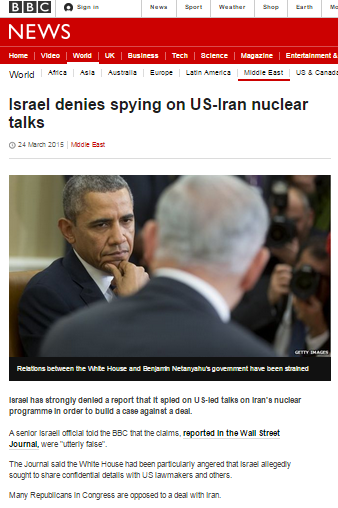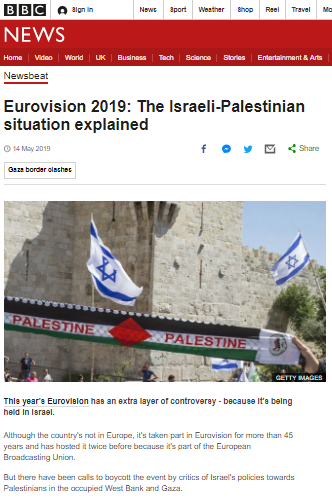If readers have perhaps had the feeling that some recent BBC News website articles had more of a whiff of largely unadulterated White House press briefing about them than analytical journalism and critical commentary, then the article published on March 24th under the headline “Israel denies spying on US-Iran nuclear talks” would have done nothing to dispel that impression.
Based on one WSJ article from one journalist who obviously had more than a little help from White House sources, the BBC’s rehash adds nothing which audiences could not have discovered for themselves by reading the original.
Buried in the article’s fifteenth paragraph is the following information:
“The White House uncovered the operation, the report said, when US intelligence agencies spying on Israel intercepted messages among officials that could only have come from closed-door talks.”
In other words the White House’s claim that Israel was spying on the P5+1 talks is based on information acquired by the US whilst it was itself spying on Israel. The BBC has nothing to say about that obvious hypocrisy and it does not sufficiently clarify to readers that any information obtained by Israel could actually have come via any one of the six countries negotiating with Iran- including the one taking a more sceptical approach to the issue than the US – or from surveillance of the other party to the negotiations.
In the next two paragraphs readers discover exactly what prompted the US administration to leak a non-event of a story to a journalist:
“But it was Israel’s sharing of inside information with US lawmakers and others that particularly angered the White House, the report quoted an official as saying.
“It is one thing for the US and Israel to spy on each other. It is another thing for Israel to steal US secrets and play them back to US legislators to undermine US diplomacy,” the unnamed official said.”
The BBC elects not to tackle the basic – and more interesting – topics of why any of the many countries which lobby the US Congress should be in a position to be able to provide that body with information it has not already been given by the US administration or why keeping Congress in the loop apparently ‘undermines’ US diplomacy. Neither does the article address the question of whether or not Israel actually told members of Congress anything they could not discover for themselves in the mountains of media reports on the P5+1 talks or from the IAEA’s reports and statements on the subject.
Most remarkably, however, this report makes no real effort to inform BBC audiences why Israel and other countries are so concerned about the progress of the P5+1 talks with Iran. The only reference to that issue comes in an insert of ‘analysis’ from Yolande Knell who writes:
“Israel’s deep concerns about any emerging deal on Iran’s nuclear programme are well known, as are the tensions this is placing on ties with the US administration.”
The trouble with that claim of course is that “Israel’s deep concerns” have been communicated to BBC audiences via the BBC filter and that framing has consistently failed to provide them with an objective view of the issue.
So once again in this article the BBC chose to blindly amplify yet another manufactured political ‘crisis’ without any critical commentary on the topic itself or questioning of the motives of the source lying behind the story. And that – apparently – is what the BBC thinks it can pass off as ‘standard-setting’ journalism.




